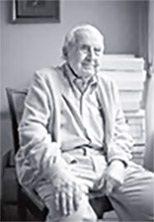Bill Josephson remembers Charlie Peters

Charles G. Peters (Peace Corps HQ 1961-68)
All too frequently these days I sit down to write a remembrance of a key, original Peace Corps person. The challenge posed by Charles G. Peters, Jr. is that he was not a headliner like Sarge, or Bill Moyers or Harris Wofford. Charlie was an incredibly innovative critic. His insight was that what the Peace Corps Director truly needed to know was what was actually happening in program y in country x, not necessarily what the country director or the regional director or the assistant director for program and operations said. Charlie’s other insight was who were the best people to do this? Investigative journalists whose irreverent curiosity would lead them to where no one else had gone and who could write.
Charles G. Peters, Jr., a trial lawyer from West Virginia, and Sargent Shriver encountered each other in the 1960 Democratic presidential primary in that state. That was a Senator Hubert H. Humphrey/Senator John F. Kennedy contest, a must win for both. HHH was the more traditional Democrat. As Mayor of Minneapolis, he had led the civil rights platform fight at the 1948 Democratic Party presidential convention. JFK, a youthful Catholic, was running in a deeply Protestant state.
JFK won that primary, and that win was critical in his successful effort to secure the 1960 Democratic party presidential nomination.
How Sarge sold Charlie on joining the Peace Corps staff, or how Charlie sold Sarge about his joining the Peace Corps staff, I do not know.
Charlie’s journalists knew how to get the facts, to marshal them in telling critiques and to tell the story in arresting prose. They interviewed volunteers where they lived and worked. How good was their training, were their assignments, how well planned were the programs, what were their accomplishments, which staff were effective, which were not?
Charlie quickly became an indispensable institution. Others came and went, sometimes came back. Charlie stayed until, in a sense, the Peace Corps and the United States’ increasing commitment to the Viet Nam war left Charlie. As Latin America regional director in the early Peace Corps, Jack Vaughn had no love for Charlie and his evaluators. The volunteer return rate from the Latin American region during Jack’s tenure there was approximately twice the return rate from the other regions. Why? Charlie’s evaluators suggested answers. Inadequate training, poor programing, ineffective staff supervision.
When Jack became Peace Corps Director in the spring of 1966, Warren W. Wiggins soon left to found TransCentury Corporation, and Charlie left to found The Washington Monthly. I was proud to be a charter subscriber and stayed until Charlie’s retirement.
Charlie was more than Sarge’s eyes and ears. He was part of the Peace Corps’ brain and soul.
Charlie and I were not close personally, but we were very close in mutual respect for each other and for each other’s work.
Charlie once gave me some advice about whom to marry. The advice I followed went spectacularly wrong. The advice I did not follow I have always wondered about.
Charlie died in Washington on Thanksgiving, November 23. He was 96 years old. He is the subject of extraordinary obituaries in The New York Times and The Washington Post.
•
Bill Josephson (Peace Corps 1961-68) was the co-author (with Warren Wiggins) of “The Towering Task” and the principal author of the President’s Executive order which brought the Peace Gorps into existence. He then was (younger than most PCVs) the General Counsel for the Agency until he “in, up and out” of the Peace Corps in 1968.
Thanks Bill—for the inside story on Charlie—he was an indispensable core pillar of the Peace Corps founding years.